六年级下册英语二单元
六年级下册英语unit2课文翻译

六年级下册英语unit2课⽂翻译 在学习英语课⽂中遇到⼀些看不懂的单词或句⼦很影响对整篇课⽂的理解,下⾯店铺为同学们带来六年级下册英语unit2课⽂翻译,欢迎⼤家学习! 六年级下册英语unit2课⽂翻译:Let's try Wu Yifan is asking John about last weekend.Listen and circle. 吴⼀凡正在询问约翰有关上周末(的事情)。
听⼀听,圈⼀圈。
1.What did John do last weekend? 1.约翰上周末⼲什么了? A.He slept. A.他睡觉了。
B.He read a new film magazine. B.他看了⼀期新的电影杂志。
2.Are Wu Yifan and John going to meet Amy together? 2.吴⼀凡和约翰将要⼀起去见埃⽶吗? A.Yes,they are. A.是的,他们将要⼀起去见埃⽶。
B.No,they aren't. B.不,他们不将要⼀起去见埃⽶。
六年级下册英语unit2课⽂翻译:let's talk John:Hey,Amy.Let's go to the bookstore.I want to buy the new film magazine. 约翰:嘿,埃⽶。
让我们去书店吧。
我想买期新的电影杂志。
Amy:Oh,I read it last weekend. 埃⽶:哦,我上周末读过它了。
John:Was it interesting? 约翰:它有趣吗? Amy:Yes,it talked about a lot of new films.What did you do last weekend? Did you see a film? 埃⽶:是的,它讲了许多关于新电影(的事情)。
你上周末⼲什么了?你看电影了吗? John:No,I had a cold.I stayed at home all weekend and slept. 约翰:没有,我感冒了。
六年级下册英语二单元知识点归纳
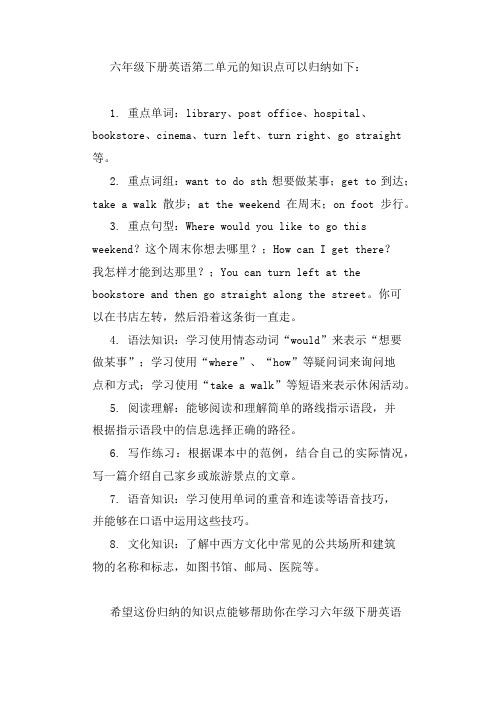
六年级下册英语第二单元的知识点可以归纳如下:
1. 重点单词:library、post office、hospital、bookstore、cinema、turn left、turn right、go straight 等。
2. 重点词组:want to do sth想要做某事;get to到达;take a walk散步;at the weekend在周末;on foot步行。
3. 重点句型:Where would you like to go this weekend?这个周末你想去哪里?;How can I get there?
我怎样才能到达那里?;You can turn left at the bookstore and then go straight along the street。
你可
以在书店左转,然后沿着这条街一直走。
4. 语法知识:学习使用情态动词“would”来表示“想要
做某事”;学习使用“where”、“how”等疑问词来询问地
点和方式;学习使用“take a walk”等短语来表示休闲活动。
5. 阅读理解:能够阅读和理解简单的路线指示语段,并
根据指示语段中的信息选择正确的路径。
6. 写作练习:根据课本中的范例,结合自己的实际情况,写一篇介绍自己家乡或旅游景点的文章。
7. 语音知识:学习使用单词的重音和连读等语音技巧,
并能够在口语中运用这些技巧。
8. 文化知识:了解中西方文化中常见的公共场所和建筑
物的名称和标志,如图书馆、邮局、医院等。
希望这份归纳的知识点能够帮助你在学习六年级下册英语
第二单元时更加轻松。
六年级下册英语二单元课文

六年级下册英语二单元课文Unit 2 Last weekend第二单元上周末Main scene (教材页码P12-13)原文:What did you do last weekend?翻译:你上周末做什么了?原文:I cleaned my room and washed my clothes on Saturday.翻译:我周六打扫了房间并洗了衣服。
原文:Did you play football with Zhang Peng?翻译:你和张鹏踢足球了吗?原文:Yes, I did. We played football on Sunday.翻译:是的。
我们周日踢足球了。
A Let's try(教材页码P14)一起试试原文:Sarah and Mike are talking about this weekend. Listen and circle. 翻译:萨拉和迈克在讨论这周末。
听并圈出。
原文:Tomorrow is Monday. We'll have class again soon.翻译:明天是周一。
我们很快又要上课了。
原文:Yes, we will.翻译:是的。
原文:How was your weekend, Mike?翻译:迈克,那你的周末怎么样?原文:It was OK. I cleaned my room and I watched TV.翻译:还不错。
我打扫了房间还看来电视。
原文:I'm going to call my grandparents now. They're in London. 翻译:我现在要给祖父母打电话。
他们在伦敦。
原文:OK, bye.翻译:好,拜拜。
A Let's talk(教材页码P14)一起说吧原文:Mike: Hi, Grandpa. How are you? How was your weekend? 翻译:你好,祖父。
PEP六年级(下册)英语Unit,2单元知识梳理(2)
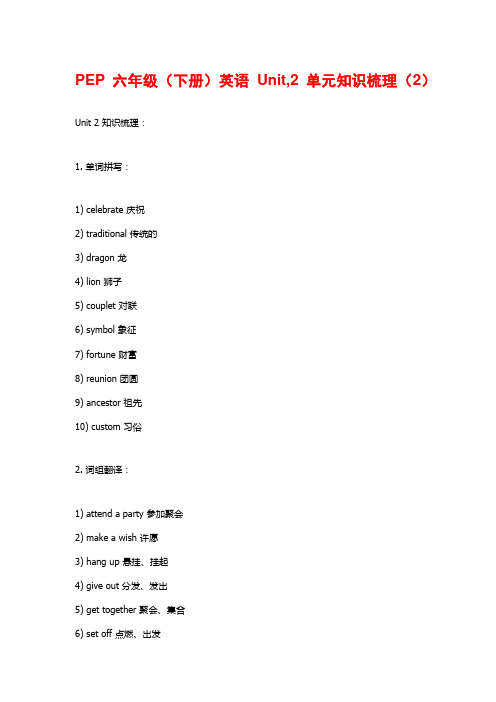
PEP六年级(下册)英语Unit,2单元知识梳理(2)Unit 2 知识梳理:1. 单词拼写:1) celebrate 庆祝2) traditional 传统的3) dragon 龙4) lion 狮子5) couplet 对联6) symbol 象征7) fortune 财富8) reunion 团圆9) ancestor 祖先10) custom 习俗2. 词组翻译:1) attend a party 参加聚会2) make a wish 许愿3) hang up 悬挂、挂起4) give out 分发、发出5) get together 聚会、集合6) set off 点燃、出发7) watch fireworks 观看烟花8) light candles 点燃蜡烛9) send out 发送、寄出10) receive red packets 领取红包3. 句子翻译:1) The Chinese New Year is the biggest traditional festival in China.中国的春节是中国最重要的传统节日。
2) People celebrate the Chinese New Year with various customs and traditions. 人们用各种各样的习俗和传统来庆祝春节。
3) During the Chinese New Year, people light candles to scare away evil spirits. 在中国的春节期间,人们点燃蜡烛来驱邪。
4) My family always gets together for a big reunion on Chinese New Year's Eve. 我家每年春节前夜都会举行一次大聚会。
5) According to Chinese tradition, we should clean our homes to sweep away bad luck before the New Year starts.根据中国的传统,我们应该在新年开始之前打扫家里以扫除厄运。
六年级下册英语二单元知识点归纳
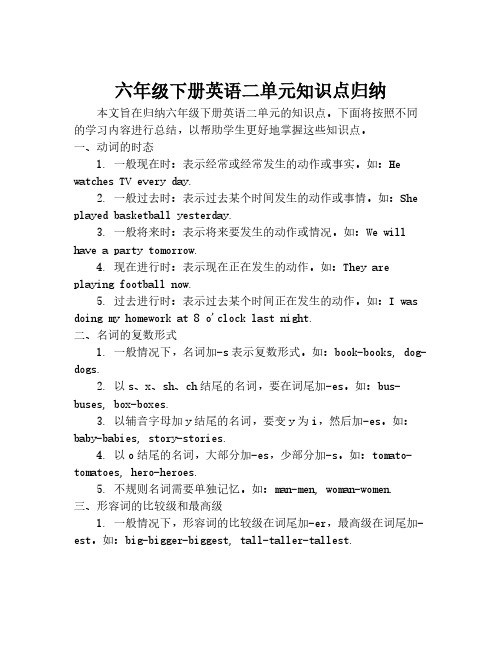
六年级下册英语二单元知识点归纳 本文旨在归纳六年级下册英语二单元的知识点。
下面将按照不同的学习内容进行总结,以帮助学生更好地掌握这些知识点。
一、动词的时态 1. 一般现在时:表示经常或经常发生的动作或事实。
如:He watches TV every day. 2. 一般过去时:表示过去某个时间发生的动作或事情。
如:She played basketball yesterday. 3. 一般将来时:表示将来要发生的动作或情况。
如:We will have a party tomorrow. 4. 现在进行时:表示现在正在发生的动作。
如:They are playing football now. 5. 过去进行时:表示过去某个时间正在发生的动作。
如:I was doing my homework at 8 o'clock last night.二、名词的复数形式 1. 一般情况下,名词加-s表示复数形式。
如:book-books, dog-dogs. 2. 以s、x、sh、ch结尾的名词,要在词尾加-es。
如:bus-buses, box-boxes. 3. 以辅音字母加y结尾的名词,要变y为i,然后加-es。
如:baby-babies, story-stories. 4. 以o结尾的名词,大部分加-es,少部分加-s。
如:tomato-tomatoes, hero-heroes. 5. 不规则名词需要单独记忆。
如:man-men, woman-women.三、形容词的比较级和最高级 1. 一般情况下,形容词的比较级在词尾加-er,最高级在词尾加-est。
如:big-bigger-biggest, tall-taller-tallest. 2. 以一个辅音字母加一个元音字母结尾的单音节词,要双写最后一个辅音字母,再加-er或-est。
如:hot-hotter-hottest, big-bigger-biggest. 3. 以y结尾的形容词,要变y为i,再加-er或-est。
六年级下册英语第二单元知识点
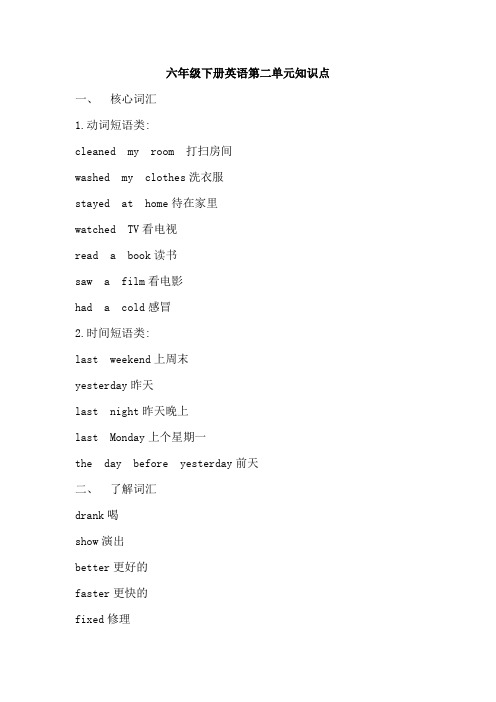
六年级下册英语第二单元知识点一、核心词汇1.动词短语类:cleaned my room 打扫房间washed my clothes洗衣服stayed at home待在家里watched TV看电视read a book读书saw a film看电影had a cold感冒2.时间短语类:last weekend上周末yesterday昨天last night昨天晚上last Monday上个星期一the day before yesterday前天二、了解词汇drank喝show演出better更好的faster更快的fixed修理broken破损的anything else其他的事情三、核心句型1.How was your weekend?你周末过得怎么样?2.—What did you do last weekend?上周末你干什么了? —I played football.我踢足球了。
解读: What did + 主语+ do + 过去时间?用来询问他人过去某一时间做了什么事情。
回答用“主语+ 动词过去式+ 其他.”。
3.—Did you read books?你读书了吗?—Yes, I did./No, I didn’t.是的,我读了。
/不,我没读。
解读: Did + 主语+ 动词原形+ 其他?用来确定他人过去某个时间是否做了某事。
回答用“Yes, 主语+ did./No, 主语+ didn’t.”。
四、了解句型I stayed at home with your grandma. 我和你奶奶待在家里。
解读: with在这里指“和……一起”。
六年级英语下册素材-Unit2 课文翻译 湘少版(三起)
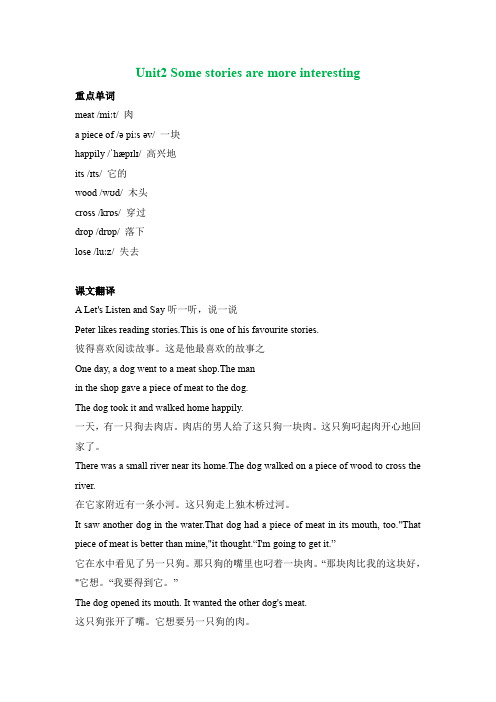
Unit2 Some stories are more interesting重点单词meat /miːt/ 肉a piece of /ə piːs əv/ 一块happily /ˈhæpɪlɪ/ 高兴地its /ɪts/ 它的wood /wʊd/ 木头cross /krɒs/ 穿过drop /drɒp/ 落下lose /luːz/ 失去课文翻译A Let's Listen and Say听一听,说一说Peter likes reading stories.This is one of his favourite stories.彼得喜欢阅读故事。
这是他最喜欢的故事之One day, a dog went to a meat shop.The manin the shop gave a piece of meat to the dog.The dog took it and walked home happily.一天,有一只狗去肉店。
肉店的男人给了这只狗一块肉。
这只狗叼起肉开心地回家了。
There was a small river near its home.The dog walked on a piece of wood to cross the river.在它家附近有一条小河。
这只狗走上独木桥过河。
It saw another dog in the water.That dog had a piece of meat in its mouth, too."That piece of meat is better than mine,"it thought.“I'm going to get it.”它在水中看见了另一只狗。
那只狗的嘴里也叼着一块肉。
“那块肉比我的这块好,"它想。
“我要得到它。
”The dog opened its mouth. It wanted the other dog's meat.这只狗张开了嘴。
六年级下册第二单元英语
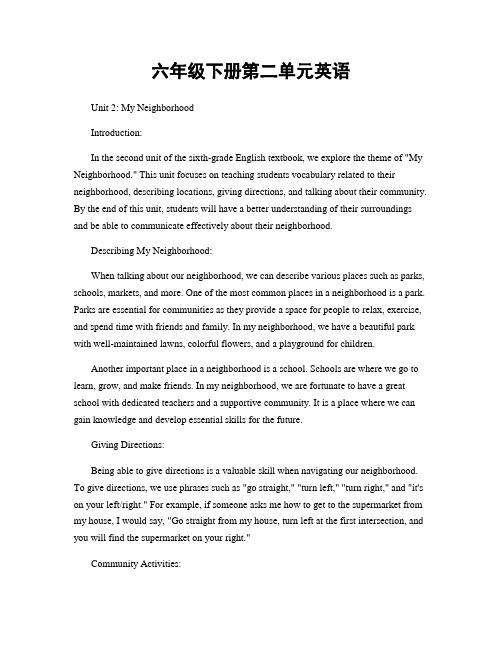
六年级下册第二单元英语Unit 2: My NeighborhoodIntroduction:In the second unit of the sixth-grade English textbook, we explore the theme of "My Neighborhood." This unit focuses on teaching students vocabulary related to their neighborhood, describing locations, giving directions, and talking about their community. By the end of this unit, students will have a better understanding of their surroundings and be able to communicate effectively about their neighborhood.Describing My Neighborhood:When talking about our neighborhood, we can describe various places such as parks, schools, markets, and more. One of the most common places in a neighborhood is a park. Parks are essential for communities as they provide a space for people to relax, exercise, and spend time with friends and family. In my neighborhood, we have a beautiful park with well-maintained lawns, colorful flowers, and a playground for children.Another important place in a neighborhood is a school. Schools are where we go to learn, grow, and make friends. In my neighborhood, we are fortunate to have a great school with dedicated teachers and a supportive community. It is a place where we can gain knowledge and develop essential skills for the future.Giving Directions:Being able to give directions is a valuable skill when navigating our neighborhood. To give directions, we use phrases such as "go straight," "turn left," "turn right," and "it's on your left/right." For example, if someone asks me how to get to the supermarket from my house, I would say, "Go straight from my house, turn left at the first intersection, and you will find the supermarket on your right."Community Activities:Communities often organize various activities to bring people together and foster a sense of unity. In my neighborhood, we have annual events like a neighborhood picnic, a charity run, and a cultural festival. These events provide an opportunity for residents to socialize, showcase their talents, and learn about different cultures. Such activities help create a strong bond among neighbors and promote a sense of belonging.Safety in the Neighborhood:Safety is a crucial aspect of any neighborhood. It is important to feel secure and protected in our surroundings. To ensure safety, communities often have measures such as streetlights, security guards, and neighborhood watch programs. In my neighborhood, we have well-lit streets, security cameras, and regular patrols by security personnel. These precautions help deter potential criminal activities and create a safe environment for everyone.Conclusion:In conclusion, the second unit of the sixth-grade English textbook focuses on the theme of "My Neighborhood." Through this unit, students learn how to describe their neighborhood, give directions, and discuss community activities. Understanding our surroundings and being able to communicate effectively about our neighborhood is essential for building strong communities. By the end of this unit, students will have a better appreciation for their neighborhood and be able to navigate it confidently.。
六年级下册英语书第2单元课文
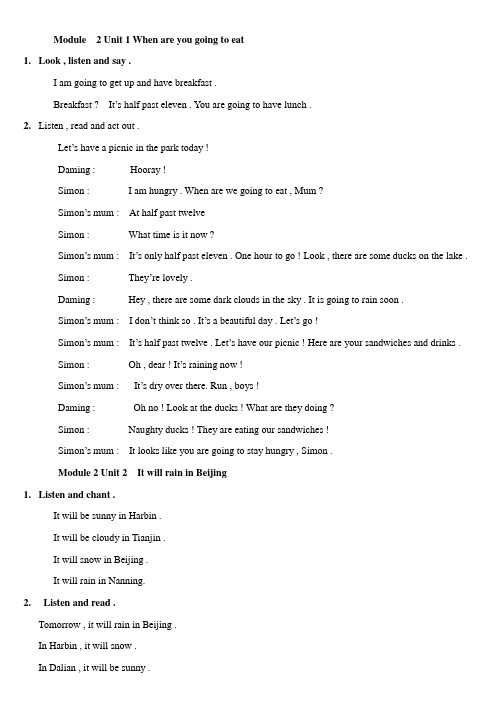
Module 2 Unit 1 When are you going to eat1.Look , listen and say .I am going to get up and have breakfast .Breakfast ? It’s half past eleven . You are going to have lunch .2.Listen , read and act out .Let’s have a picnic in the park today !Daming : Hooray !Simon : I am hungry . When are we going to eat , Mum ?Simon’s mum : At half past twelveSimon : What time is it now ?Simon’s mum : It’s only half past eleven . One hour to go ! Look , there are some ducks on the lake .Simon : They’re lovely .Daming : Hey , there are some dark clouds in the sky . It is going to rain soon .Simon’s mum : I don’t think so . It’s a beautiful day . Let’s go !Simon’s mum : It’s half past twelve . Let’s have our picnic ! Here are your sandwiches and drinks .Simon : Oh , dear ! It’s raining now !Simon’s mum : It’s dry over there. Run , boys !Daming : Oh no ! Look at the ducks ! What are they doing ?Simon : Naughty ducks ! They are eating our sandwiches !Simon’s mum : It looks like you are going to stay hungry , Simon .Module 2 Unit 2 It will rain in Beijing1.Listen and chant .It will be sunny in Harbin .It will be cloudy in Tianjin .It will snow in Beijing .It will rain in Nanning.2.Listen and read .Tomorrow , it will rain in Beijing .In Harbin , it will snow .In Dalian , it will be sunny .In Xi’an , it will be windy . In Guangzhou , it will be hot .。
人教版小学六年级英语下册Unit2单元测试卷带答案
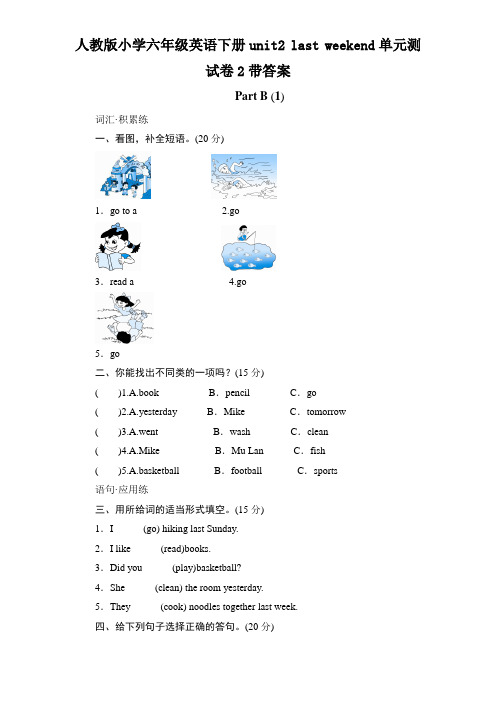
人教版小学六年级英语下册unit2 last weekend单元测试卷2带答案Part B (1)词汇·积累练一、看图,补全短语。
(20分)1.go to a______ 2.go______3.read a______ 4.go______5.go______二、你能找出不同类的一项吗?(15分)()1.A.book B.pencil C.go()2.A.yesterday B.Mike C.tomorrow()3.A.went B.wash C.clean()4.A.Mike B.Mu Lan C.fish()5.A.basketball B.football C.sports语句·应用练三、用所给词的适当形式填空。
(15分)1.I______(go) hiking last Sunday.2.I like______(read)books.3.Did you______(play)basketball?4.She______(clean) the room yesterday.5.They______(cook) noodles together last week.四、给下列句子选择正确的答句。
(20分)()1.Where did you go?A.Played football. B.Shanghai. C.I go to Shanghai.()2.What did Mike do?A.He did his homework. B.She did her housework.C.He goes to school.()3.Did Wu Yifan go fishing?A.Yes,he did. B.No,she didn't. C.Yes,she didn't.()4.When did you read a book?A.I readed a book at 6:00. B.I read a book yesterday.C.Tomorrow.()5.How did you go to school?A.On feet. B.By foot. C.On foot.五、你能找出下列句子中的错误吗?找出来并改一改。
PEP人教版小学英语六年级下册Unit 2单元知识梳理总结
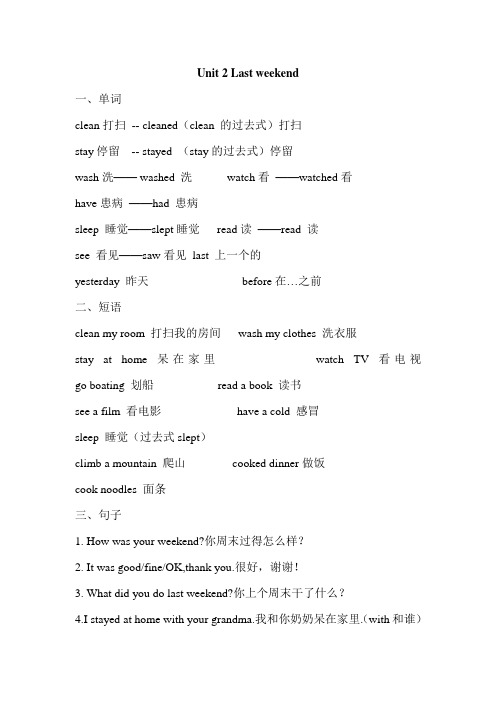
Unit 2 Last weekend一、单词clean打扫-- cleaned(clean 的过去式)打扫stay停留-- stayed (stay的过去式)停留wash洗—— washed 洗watch看——watched看have患病——had 患病sleep 睡觉——slept睡觉read读——read 读see 看见——saw看见last 上一个的yesterday 昨天before在…之前二、短语clean my room 打扫我的房间wash my clothes 洗衣服stay at home 呆在家里watch TV 看电视go boating 划船read a book 读书see a film 看电影have a cold 感冒sleep 睡觉(过去式slept)climb a mountain 爬山cooked dinner做饭cook noodles 面条三、句子1. How was your weekend?你周末过得怎么样?2. It was good/fine/OK,thank you.很好,谢谢!3. What did you do last weekend?你上个周末干了什么?4.I stayed at home with your grandma.我和你奶奶呆在家里.(with和谁)5. Did you do anything else?你还做了其他什么事吗?6. Yes,I cleaned my room and washed my clothes.是的,我扫了房间,还洗了衣服。
7.I want to buy the new film magazine.我想买期新的电影杂志。
8.Did you see a film?你看电影了吗?No,I didn’t .I had a cold. I stayed at home all weekend and slept.没有,我感冒了。
(完整)六年级英语下册第二单元

(完整)六年级英语下册第二单元六年级英语下册第二单元
1. 单词研究
在第二单元中,我们研究了许多新的英语单词。
以下是一些重要的单词及其意思:
1. apple - 苹果
2. banana - 香蕉
3. cat - 猫
4. dog - 狗
5. elephant - 大象
6. fish - 鱼
7. grape - 葡萄
8. hat - 帽子
9. ice cream - 冰淇淋
10. juice - 果汁
2. 句子练
除了研究单词,我们还练了构造简单的英语句子。
以下是一些例子:
1. I like apples. - 我喜欢苹果。
2. She has a cat. - 她有一只猫。
3. We can eat ice cream. - 我们可以吃冰淇淋。
4. They drink juice. - 他们喝果汁。
3. 对话理解
我们在这个单元中也研究了如何理解和回答简单的对话。
以下是一个例子:
A: Do you like bananas? - 你喜欢香蕉吗?
B: Yes, I do. - 是的,我喜欢。
4. 综合练
最后,我们进行了一些综合练,包括听力和阅读理解。
这些练帮助我们巩固了所学的单词和句子。
总结
第二单元是一个简单而有趣的英语研究单元。
通过研究新的单词、构造句子、理解对话和进行综合练,我们提高了英语能力并增加了对英语的兴趣。
英语六年级下册第二单元
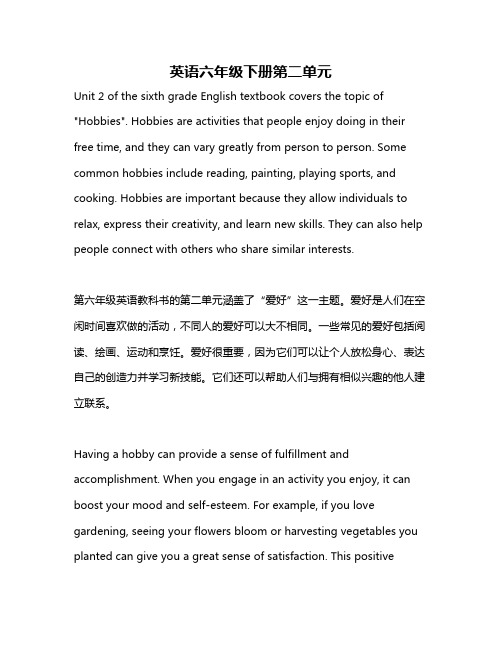
英语六年级下册第二单元Unit 2 of the sixth grade English textbook covers the topic of "Hobbies". Hobbies are activities that people enjoy doing in their free time, and they can vary greatly from person to person. Some common hobbies include reading, painting, playing sports, and cooking. Hobbies are important because they allow individuals to relax, express their creativity, and learn new skills. They can also help people connect with others who share similar interests.第六年级英语教科书的第二单元涵盖了“爱好”这一主题。
爱好是人们在空闲时间喜欢做的活动,不同人的爱好可以大不相同。
一些常见的爱好包括阅读、绘画、运动和烹饪。
爱好很重要,因为它们可以让个人放松身心、表达自己的创造力并学习新技能。
它们还可以帮助人们与拥有相似兴趣的他人建立联系。
Having a hobby can provide a sense of fulfillment and accomplishment. When you engage in an activity you enjoy, it can boost your mood and self-esteem. For example, if you love gardening, seeing your flowers bloom or harvesting vegetables you planted can give you a great sense of satisfaction. This positivefeeling can carry over into other areas of your life, making you happier and more confident overall.拥有一个爱好可以给人一种满足感和成就感。
pep小学英语六年级下册第二单元测试题及答案
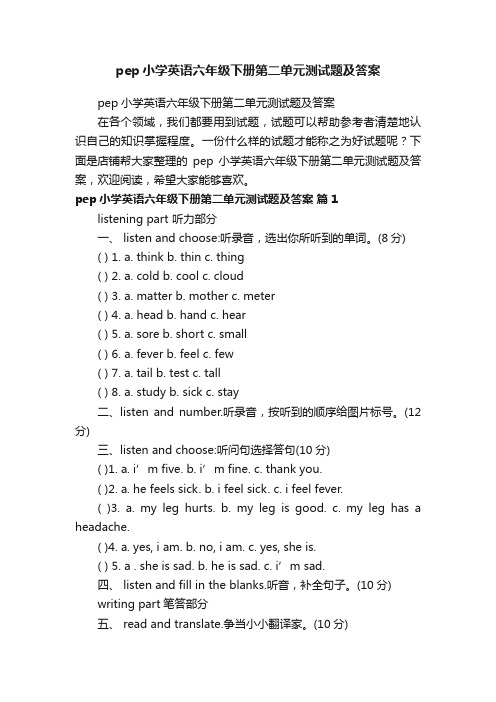
pep小学英语六年级下册第二单元测试题及答案pep小学英语六年级下册第二单元测试题及答案在各个领域,我们都要用到试题,试题可以帮助参考者清楚地认识自己的知识掌握程度。
一份什么样的试题才能称之为好试题呢?下面是店铺帮大家整理的pep小学英语六年级下册第二单元测试题及答案,欢迎阅读,希望大家能够喜欢。
pep小学英语六年级下册第二单元测试题及答案篇1listening part 听力部分一、 listen and choose:听录音,选出你所听到的单词。
(8分)( ) 1. a. think b. thin c. thing( ) 2. a. cold b. cool c. cloud( ) 3. a. matter b. mother c. meter( ) 4. a. head b. hand c. hear( ) 5. a. sore b. short c. small( ) 6. a. fever b. feel c. few( ) 7. a. tail b. test c. tall( ) 8. a. study b. sick c. stay二、listen and number.听录音,按听到的顺序给图片标号。
(12分)三、listen and choose:听问句选择答句(10分)( )1. a. i’m five. b. i’m fine. c. thank you.( )2. a. he feels sick. b. i feel sick. c. i feel fever.( )3. a. my leg hurts. b. my leg is good. c. my leg has a headache.( )4. a. yes, i am. b. no, i am. c. yes, she is.( ) 5. a . she is sad. b. he is sad. c. i’m sad.四、 listen and fill in the blanks.听音,补全句子。
六年级下册英语第二单元知识点笔记
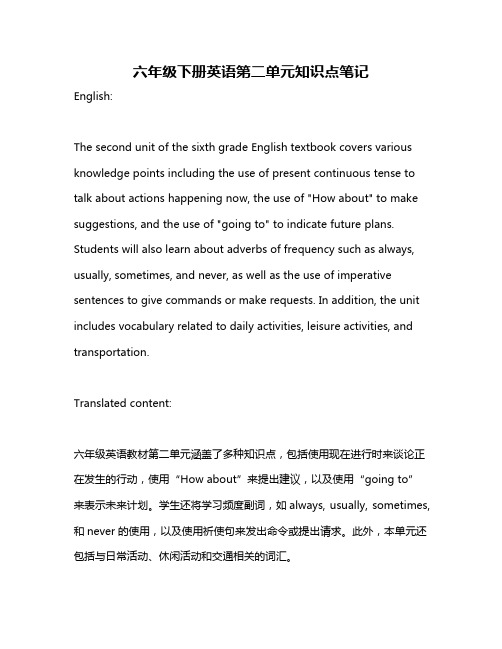
六年级下册英语第二单元知识点笔记English:The second unit of the sixth grade English textbook covers various knowledge points including the use of present continuous tense to talk about actions happening now, the use of "How about" to make suggestions, and the use of "going to" to indicate future plans. Students will also learn about adverbs of frequency such as always, usually, sometimes, and never, as well as the use of imperative sentences to give commands or make requests. In addition, the unit includes vocabulary related to daily activities, leisure activities, and transportation.Translated content:六年级英语教材第二单元涵盖了多种知识点,包括使用现在进行时来谈论正在发生的行动,使用“How about”来提出建议,以及使用“going to”来表示未来计划。
学生还将学习频度副词,如always, usually, sometimes,和never的使用,以及使用祈使句来发出命令或提出请求。
此外,本单元还包括与日常活动、休闲活动和交通相关的词汇。
小学六年级英语下册第二单元作文优秀范例

小学六年级英语下册第二单元作文优秀范例全文共6篇示例,供读者参考篇1I'm a sixth grader and today I want to share with you all about the second unit in our English textbook. This unit is all about learning new vocabulary words and using them in sentences and paragraphs.In this unit, we learned words like "adventure", "mysterious", "explore", and "discover". We had so much fun coming up with sentences using these new words. For example, "I had an amazing adventure exploring the mysterious caves in the forest" or "We were thrilled to discover a hidden treasure in the old house".We also learned how to write paragraphs using these words. We wrote about our own adventures and shared them with our classmates. It was so cool to hear everyone's different stories and experiences.I really enjoyed this unit because it challenged me to think creatively and expand my vocabulary. I feel more confident using these new words in my writing and speaking now.I can't wait to see what we will learn in the next unit. Learning English is so much fun!篇2Hello everyone! Today I want to share with you my wonderful essay about the second unit in the sixth grade English textbook. This unit is all about going on a trip.Last month, my family and I went on a trip to the beach. We woke up early in the morning, packed our bags, and drove to the beach. The weather was perfect and the sun was shining brightly. When we arrived, we couldn't wait to jump into the water and play in the sand.We spent the whole day swimming, building sandcastles, and collecting seashells. It was so much fun! We also had a picnic on the beach and enjoyed some delicious snacks. In the evening, we watched the sunset and it was so beautiful.During the trip, I practiced speaking English with my family. I asked for directions, ordered food, and talked to other people at the beach. It was a great opportunity to improve my English skills and have fun at the same time.I will never forget this trip to the beach. It was a fantastic experience and I can't wait to go on another adventure with my family. I love going on trips and exploring new places.,。
人教版六年级下册第2单元英语作文

人教版六年级下册第2单元英语作文全文共3篇示例,供读者参考篇1Unit 2 My DayMy DayMy day starts at 7 o'clock in the morning. I wake up, brush my teeth, and wash my face. Then I have breakfast. I usually have milk, toast, and fruit for breakfast. After breakfast, I get dressed and pack my school bag.I leave the house at 8 o'clock and walk to school. School starts at 8:30. In the morning, we have English, Math, and Chinese classes. I like English the most because it's fun to learn new words and practice speaking.At noon, we have lunch break. I have lunch in the school cafeteria with my friends. We chat and laugh while eating. After lunch, we have Science, Art, and PE classes. I love PE class because I get to play games and run around with my friends.School ends at 3:30 in the afternoon. After school, I go home and have a snack. Then I do my homework and study for tests. Sometimes, I play with my toys or read a book.At 6 o'clock, I have dinner with my family. We eat together and talk about our day. After dinner, I relax and watch TV for a while. Before bedtime, I brush my teeth, take a shower, and get ready for bed.I go to bed at 9 o'clock. I read a book or listen to music before falling asleep. It's been a long and busy day, but I am happy and grateful for my family, friends, and school. I sleep peacefully and look forward to the next day.篇2Unit 2 My FamilyHi, my name is Lily. I am a sixth grader in a primary school. Today I want to talk about my family.I have a big and happy family. There are five people in my family: my parents, my younger brother, my younger sister and me. My dad is tall and strong. He works in a big company. My mom is a teacher. She is very kind and she likes to play games with us.My younger brother is ten years old. He likes playing football and watching cartoons. He always makes funny jokes that make us laugh. My younger sister is five years old. She is very cute and she likes to play with dolls. She also likes to sing and dance.In the evening, we usually have dinner together. We talk about our day and share some interesting stories. After dinner, we watch TV or play games together. Sometimes we go for a walk in the park or have a picnic.I love my family very much. They always support me and encourage me to do my best. I feel very lucky to have such a wonderful family.That's all about my family. Thank you for listening.篇3Unit 2 FriendshipFriendship is an important topic in our lives. As the saying goes, "A friend in need is a friend indeed." Having good friends can bring us happiness, support, and companionship. In this unit, we have learned about different ways to make and maintain friendships.One of the key aspects of friendship is communication. We have practiced how to introduce ourselves, talk about our hobbies, and ask for help. By being open and honest with our friends, we can build trust and understanding in our relationships. We have also learned about the importance of listening and showing empathy towards our friends' feelings and experiences.Another important aspect of friendship is teamwork. We have worked on group projects together, taking turns and sharing responsibilities. By cooperating and collaborating with our friends, we can achieve common goals and solve problems effectively. We have learned that teamwork requires patience, compromise, and respect for each other's ideas.In addition to communication and teamwork, we have also discussed the qualities of a good friend. A good friend is someone who is loyal, trustworthy, and supportive. They are there for us in good times and bad, offering a shoulder to cry on and a listening ear. Good friends also celebrate our successes and encourage us to be the best version of ourselves.In conclusion, friendship is a valuable and rewarding part of our lives. By practicing good communication, teamwork, and being a good friend, we can develop strong and meaningful relationships that last a lifetime. Let's cherish and appreciate thefriends we have, and strive to be the kind of friend we would want to have.。
六年级下册二单元英语单词

六年级下册二单元英语单词Unit 2 Last weekend.一、单词。
1. cleaned [kliːnd](动词clean的过去式)打扫;清洁。
2. stayed [steɪd](动词stay的过去式)停留;待。
3. washed [wɒʃt](动词wash的过去式)洗。
4. watched [wɒtʃt](动词watch的过去式)看。
5. had [hæd](动词have的过去式)有;使(have的过去式和过去分词)6. had a cold [hæd ə kəʊld] 感冒。
7. slept [slept](动词sleep的过去式)睡觉。
8. read [red](动词read的过去式)读;阅读。
9. saw [sɔː](动词see的过去式)看见。
10. last [lɑːst] adj. 最近的;上一个的;末尾的;最后的;adv. 最后;最终。
11. yesterday [ˈjestədeɪ] n. 昨天。
12. before [bɪˈfɔː(r)] prep. 在……之前;adv. 以前。
13. drank [dræŋk](动词drink的过去式)喝。
14. show [ʃəʊ] n. 演出;节目;表演;v. 给……看;展示;(动词过去式showed,过去分词shown或showed)15. magazine [ˌmæɡəˈziːn] n. 杂志;期刊。
16. better [ˈbetə(r)] adj. & adv. (good和well的比较级)更好的(地);较好的(地);更健康的(地)17. faster [ˈfɑːstə(r)] adj. & adv. (fast的比较级)更快的(地)18. hotel [həʊˈtel] n. 旅馆;酒店。
19. fixed [fɪkst](动词fix的过去式)修理;修补。
20. broken [ˈbrəʊkən] adj. 破损的;残缺的;出故障的。
